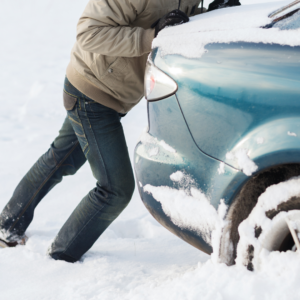We have special challenges in keeping our vehicles clean in the winter. In order to keep our roads as safe as possible for travel, Colorado Department of Transportation (CDOT) and our local/county road crews do everything they can to mitigate slippery roads. However, the chemicals utilized can be detrimental to your car’s paint and metal surfaces. With grit and chemicals damaging paint and chrome surfaces as well as increasing corrosion and friction between parts, the exterior surfaces of your vehicle can suffer.
What is used on our roads in Colorado? From the CDOT website, all their products contain some form of salt (sodium chloride or magnesium chloride) plus a corrosion inhibitor. From there, what they put on the roads depends on the weather system that is coming. When they know that freezing temperatures and moisture are imminent, they use an “Anti-Icing Brine” hours ahead of the expected snow or ice storm. This mixture produces the whitish-color stripes that you see on the road and it prevents the ice from sticking to the road. This has the added benefit of helping the plows remove the ice/snow when they do plow the roads.
De-icing treatments are used when there is already snow or ice on the road. De-icing mixtures penetrate down through the snow to affect the pavement itself. “Ice Slicer” is a solid de-icer combination of granular salt and magnesium chloride and is used during a storm when moisture is still coming down. In higher elevations or hilly areas, sand will be added to the de-icer to improve traction.
In addition, the chemicals used will vary depending upon the temperature of the pavement. Chloride (above 16 degrees), Magnesium Chloride (below 16 degrees), or “Melt-Down” Apex (brand name product used above -4 degrees) will be utilized to decrease the freezing point, thereby decreasing the amount of ice buildup.
Prevention is truly the key to keeping your car as clean as possible and protected. A good coat of wax on the paint and chrome surfaces applied in the fall (now!) before you encounter Mag Chloride will help the most to protect and clean your vehicle. Keep in mind that Mag Chloride is also used on dirt roads in CO in the summer months to decrease dust and improve the surface of the roads.
Keeping your car washed frequently during the winter will help prevent damage to metal and paint surfaces. After you have washed the paint surfaces, you may find that you still have salty, white residue still on the car. One thing you can try is mixing one gallon vinegar to a gallon of water and apply with a spray bottle. Let it sit on the paint surface for a few minutes before you rinse it off. Be careful not to scrub with sponge or rag if there is still sand or salt granules on the car – you will further scratch the paint and that cannot be removed!
Another problem is that the Magnesium Chloride will get into areas of your car that you can’t even access! Finding a car wash that cleans the undercarriage of your car and cleaning it soon after driving on treated roads will certainly help.
Even with excellent management of ice on the roads, the only thing between you and road is your tires. If you do not have adequate tread on your tires, no amount of mag chloride will help and your car will be like Santa’s sleigh! CO Traction Law requires 3/16” tread depth – if you don’t know how to assess your tire treads, stop in anytime and we will inspect your tires.
Drive safely on the roads this winter!




